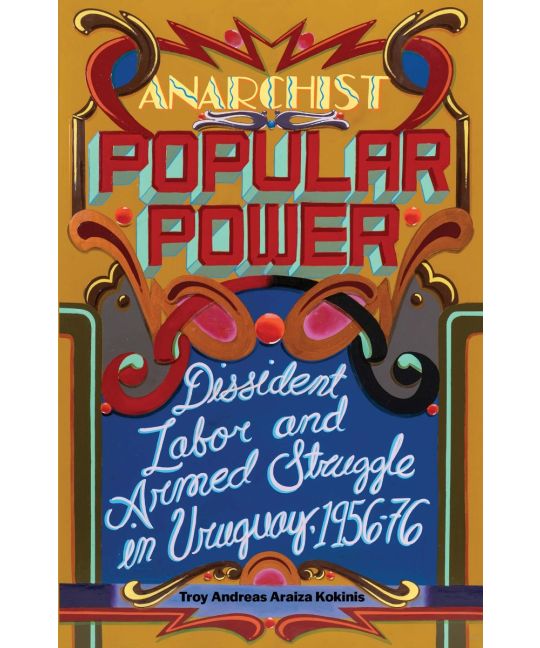AK Press
Anarchist Popular Power Dissident Labor and Armed Struggle in Uruguay, 1956–76
Anarchist Popular Power Dissident Labor and Armed Struggle in Uruguay, 1956–76
Couldn't load pickup availability
A Cold War-era study of Latin American anarchism in action.
Araiza Kokinis's study of the Uruguayan Anarchist Federation (FAU) broadens our understanding of the Cold War-era political landscape beyond the capitalism-communism and Old Left-New Left binaries that dominate the historiography of the epoch.
Arguably the most impactful anarchist organization globally in the Cold War era, the FAU viewed everyday people as revolutionary protagonists and sought to develop a popular counter-subjectivity through accumulating experiences directly challenging the market and the state. The FAU argued that everyday people transformed into revolutionary subjects through the regular practice of collective direct action in labor unions, student organizations, and neighborhood councils. Their slogan was "create popular power," and their praxis differed from nationalist strains of Marxism at the time. The strategies and tactics promoted by FAU, ones in which everyday people took on roles as historical protagonists, offered the largest threat to maintaining social order in Uruguay and thus spawned a military takeover of the state to dismantle and deflate their vibrant popular revolt.
With less than eighty militants, FAU played a key role both sparking and networking popular protagonism in workplaces, neighborhoods, and on campuses. The FAU worked in coalition with the Communist Party (PCU), MLN-Tupamaros (MLN-T), and other Left organizations to support a unified Left project while simultaneously challenging hegemonic strategies, tactics, and discourses. Unlike other anarchist groups worldwide, which took to individualism and counterculture in response to Marxism’s popularity throughout the sixties, the FAU embraced Third Worldism and a class struggle strategy that made them a relevant force amongst popular social movements.
Throughout the constitutional dictatorship (1967–73), the Tendencia Combativa, a coalition of dissident labor unions spearheaded by FAU, controlled one-third of the nation’s unions in some of the most lucrative industries, especially in the private sector. By the time of June 27, 1973, military coup, a majority of Uruguayan industrialists recognized organized labor as the most serious threat to national security. Moreover, communications between US Ambassador to Uruguay Ernest V. Siracusa and US Secretary of State Henry Kissinger, showed the dictatorship’s primary concern was to repress the surging labor movement rather than confronting a waning Tupamaro guerrilla movement. The FAU’s anarchist activism within this broader climate of worker revolt threw a wrench in the 1970s neoliberal experiments in Latin America that later migrated north to impoverish American workers from the 1980s until today.
Praise for Anarchist Popular Power:
"This is an exciting book that adds to the rich history of anarchism. An English-language history of the FAU is long overdue and Troy Andreas Araiza Kokinis's work does not disappoint. Thoroughly and sensitively researched, it places the FAU in their political and cultural context, presenting us with an understanding of a complex and flexible organization that could both work with others but still maintain its own anarchist autonomy. Books like this make one realize how much there is to learn and reflect on. Essential reading."
—Barry Pateman, Kate Sharpley Library and associate editor of Emma Goldman: A Documentary History of the American Years
“Troy's book is an important contribution to think about the ways in which anarchism, scarcely studied in the second half of the century, was also part of the turn of the sixties' New Left in Latin America. The so-called specifism of the FAU shows how that anarchist tradition, very influential in the Uruguay of the first half of the century, managed to rethink itself and actively influence the new cycles of social and political struggles.”
—Aldo Marchesi, author of Latin America's Radical Left: Rebellion and Cold War in the Global 1960s
"When trying to understand a period as intense as the late 1960s in Uruguay, it is greatly important to illuminate the struggles waged by so-called 'minority' political organizations. Although they were never hegemonic among the organized popular sectors, studying groups like the FAU is essential for understanding what happened beyond the scale of that which was visible because they pushed for the types of collective actions that had a broad impact both in majority parties and popular sectors of the Left, as well as other groups who organized from below." —Raúl Zibechi, author of Territories in Resistance
"Latin American anarchism, especially that of the Río de la Plata region, has followed unique paths and assumed different configurations depending on the historical moment that its militants’ hectic political lives were going through. Some of these moments and events have been more investigated than others, either because of the access to the documents or because of the prominence of the actions. In this text, much less active decades are addressed compared to the well-studied first half of the twentieth century, and the author takes on the thorny issue of armed struggle. With a gaze that goes from north to south and then back again to think about these debates, the author goes through primary source materials from the epoch and does not escape the tensions and internal conflicts of those who took on the struggle and libertarian ideal at the same time. Troy Araiza Kokinis’s proposal and the discussions that his book will undoubtedly provoke are proof of the vitality of anarchism as a crucial part of thinking about local and global history." —Laura Fernández Cordero, Center for Documentation and Investigation of Left Culture (Buenos Aires) and author of Amor y anarquismo and Feminismos para la revolución
Troy Andreas Araiza Kokinis grew up in LA's Pomona Valley. His family's participation in the Chicano movement grew his interest in Cold War-era Latin American social movements. Araiza Kokinis is a lecturer at the University of California, San Diego and also a sign painter, rock climber, and Dodger baseball fanatic.


